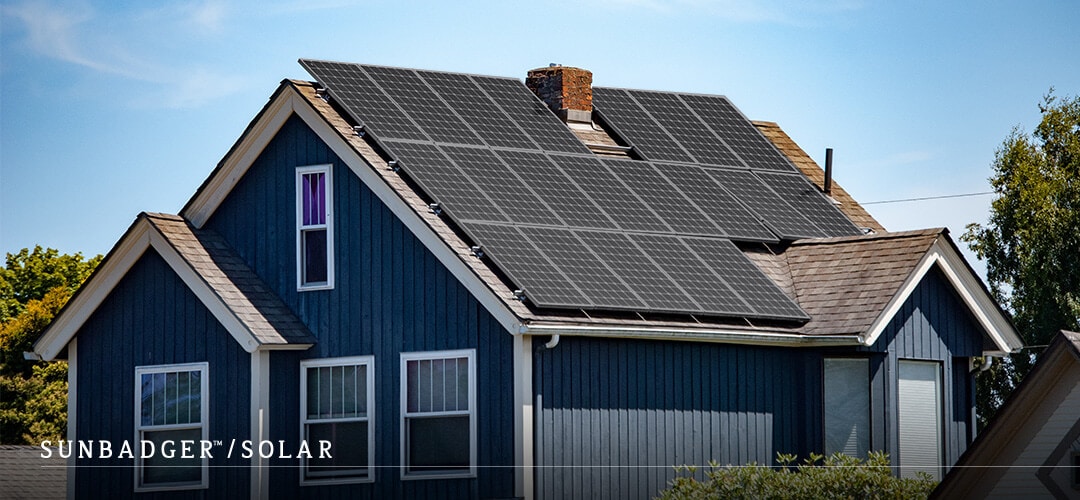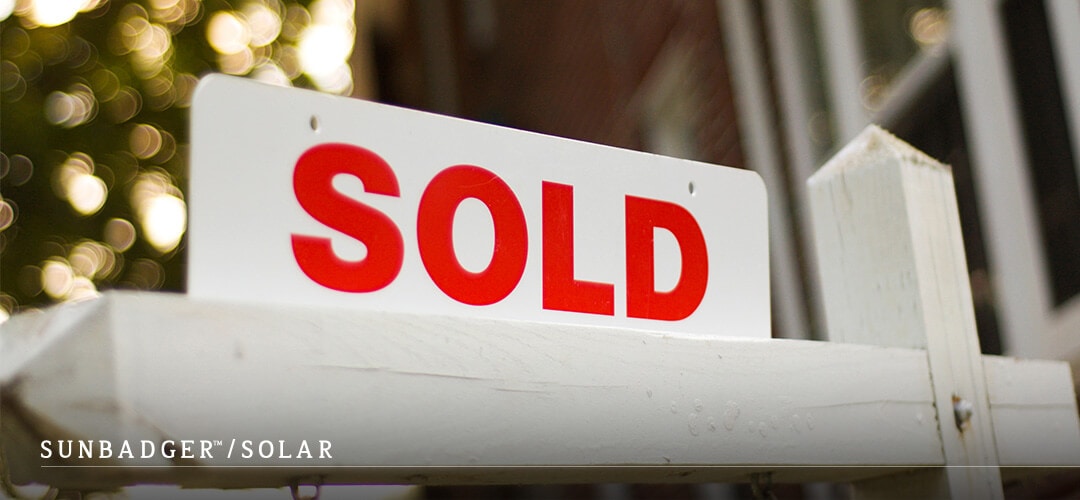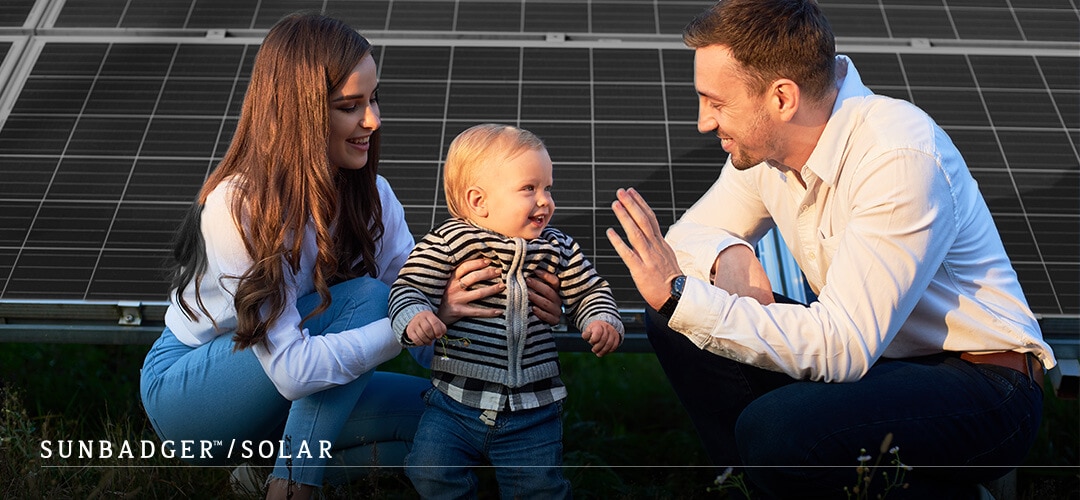There is a prevailing myth that selling a house with solar panels is difficult. The fact is that selling a home with solar panels may require some extra steps but may also increase the value of your home and how fast it sells.
Selling your home with solar panels can come with a lot of uncertainty, but it doesn’t have to. This guide uses industry research to answer the question, is it harder to sell a house with solar panels? It includes details on selling a house with leased solar panels and how to transfer solar panels to new owners so that you can feel confident throughout the selling process.
Explore ways to lower your carbon footprint and energy bill from Sun Badger Solar.
Are Solar Panels an Asset?
Solar panels are an asset for many homeowners. Assets, unlike liabilities, do not only cost money; they also generate money or savings.
Solar panels are assets in four main ways:
- They increase the value of your home.
- Solar homes sell faster.
- They produce an essential utility.
- Homeowners qualify for a 30% tax credit on their solar system.
Photovoltaic (PV) panels and their corresponding systems need little maintenance and can last more than 25 years. Because solar panels depreciate slowly and produce a valuable commodity, they are cash positive. Whether you are saving money on your electricity bill, selling your excess solar energy, or both, you will gain extra spending money by investing in solar.
To get the most value out of your solar system, speak with your tax professional about applying forthe Federal Investment Tax Credit (ITC) when you do your taxes. The ITC allows you to deduct 30% of the cost of a solar system (including installation costs) from your federal taxes. Both residential and commercial solar projects qualify for the ITC. Additional tax credits may be available through your state. For example, Illinois offers up to 60% tax credits for residential and commercial solar projects.
How Solar Panels Impact Property Value
The resale value of a house with solar panels is often higher than a comparable house without solar. According to the National Renewable Energy Laboratory (NREL), for every $1 a homeowner saves on energy with a solar system, the home’s value increases by $20.
The exact effects a solar system has on the value of a property depends on various factors including the age of the solar panels and the electricity rates in the area. To answer the question of do solar panels help sell a house, every homeowner needs to explore the following factors:
- Location: The location of your home affects not only your property value but also the impact of solar on your home’s value. Solar panels may be more valued or sought after in areas with high rates of sunshine and high electricity rates.
- Electricity Rate: Electricity rates are how much residents pay for electricity based on how many kilowatts the household uses per hour (kWH). The average residential rate across the country is 15.45 cents per kWh. Rates significantly vary by city, state, and region. Rates also change throughout the day based on demand. Generally, energy prices are lowest between 10 pm and 5 am because most people are asleep.
- Age of Solar System: A quality PV solar system will depreciate slowly, but the age of the solar system will still have some effect on its added value, especially if its warranty has expired. Can you sell your house with solar panels that are 25 years old? Yes, but they will likely add little to the home value because they may need more maintenance and will not produce as much energy as a newer system.
- Age of the Home’s Roof: PV panels require a sturdy roof to remain safe and functional throughout their lifespan. Ideally, the panels are installed on a new roof to maximize their longevity. If the roof under the panels needs repairs, that may decrease the solar system value as the panels would need to be removed to fix the roof.
- Solar Panel Ownership: If you own your solar system with no loan or lease, then the system may add more value to your home. Consider paying off any outstanding loan or buying out your remaining lease before selling. Then, you can increase the asking price of your home accordingly.
Do Houses with Solar Panels Sell for More?
Not only can you sell a house with solar panels, but you can probably sell it for a higher price because of the added value a solar energy system brings to a property. According to the Department of Energy, houses with solar panels sell for $15,000 more on average than houses without solar. Installing solar panels can be an effective way to increase your property value.
This is similar to the average cost of solar panels for residential homes from Sun Badger Solar. That means that if you buy a solar system for your home and sell it, you will most likely make up for the cost of the system.
Do Homes with Solar Panels Sell Faster?
The research is clear on the increased value of a home with solar panels, but do houses with solar sell faster? Based on a study done by the NREL, homes with solar sell up to 20% faster. This study was completed in San Diego, CA, an area with a lot of demand for solar due to a large number of sunny days and high energy costs.
Do homes sell faster with solar across the U.S.? While the NREL study is widely referenced online, there is no definitive research to show that solar homes sell at the same speed everywhere in the U.S.
For homeowners looking to sell their homes quickly, here are some suggestions of what you can do. Houses with solar panels sell faster if the solar system is fully paid off, so plan accordingly and try to pay any outstanding loan or lease before you list the house.
- Mention Solar in the Home Listing: Solar is a selling point! Describe your solar system, how much energy it produces, and how much you save on your electricity bill. If your solar panels are paid off, you can include their value in the house listing price.
- Keep Up with Maintenance: While PV solar panels themselves need very little maintenance, you should ensure there are no overhanging trees above or around the panels. Tree branches could block solar rays from reaching the panels, or they could damage the PV system. Keep trees well-trimmed for the listing photos and throughout the selling process to sell your home faster.
- Stay Informed: When the seller is confident in the value solar panels add to their home, they can highlight it and educate potential buyers who may be wary of buying a home with solar panels. This helps sellers to avoid delays in the process, even when selling a house with financed solar panels.
Factors that Impact a Home’s Speed of Sale
Do homes with solar sell faster regardless of other factors? That’s a difficult question to answer. To ensure a positive home selling experience, research each of the following factors that impact a home’s speed of sale.
- Neighborhood and location
- Home size
- Property size
- Age of home
- Interior and exterior conditions
- Upgrades and updates (including solar)
- Property comparison
- The economic market
- Supply and demand
Every home is unique, and so is every homeowner’s experience selling their home. If you have questions about these factors and how they affect your home’s speed of sale, you should consult with your listing agent.
How Solar Panels are Financed
Before selling your home with solar panels, you need to determine who owns your solar panels. You may have financed them and paid them off or have a lease from a solar company. If you are unsure how your solar panels are financed, you should review your receipts and documents.
- Purchased Panels in Full: If you have the means to spend $15,000-$25,000 on a solar system and installation, this is an ideal option. When you own your solar system, you pay no interest and get tax credits to offset the cost.
- Financed Solar System: Financing your solar system with a loan means you still get a tax credit but can pay for the system in increments over time. With financing, you have to pay interest and sometimes a down payment. Sun Badger Solar offers a zero-down solar loan to minimize barriers to sustainable energy for Americans.
- Leased Solar System: A solar lease differs from a loan because, with a lease, you do not own the solar system. The solar company retains ownership, and you do not receive any tax credit. This is a significant disadvantage of a solar lease versus a solar loan. If you plan to sell, you can buy out your solar lease or transfer it to the new homeowner.
Selling a home when you own a solar system is straightforward. The ease of selling a house with a solar panel loan depends on the type of loan. For secured solar loans, the owner must pay off the loan balance before selling the home with the solar system so ownership can be transferred to the buyer. The loan usually cannot be transferred directly. With some unsecured loans, you can sell your solar system and continue to pay off the loan until the balance reaches zero. Check with your loan provider for more details.
What Happens to Solar Panels When You Sell Your House
Selling houses with solar panels is easier than it seems. Like any upgrades to your home, such as a home alarm system, the ownership of the solar system will transfer to the new homeowner. For a smooth solar panels transfer of ownership, notify your solar company that you are selling even if you own your solar panels. The warranty and other provided services can be transferred to the new owner.
This process may get more complicated when selling a home with leased solar panels. Because the solar company owns the solar system, new owners will have to take over the lease to transfer solar panel ownership. This requires signing lease documents and agreeing to make regular payments for the duration of the predetermined lease period. At the end of the lease, the new owner will have the option to buy the solar panels or have them removed.
Buying a home with leased solar panels can be intimidating. Potential buyers unfamiliar with solar may be apprehensive about buying a house with leased solar panels. They may be concerned about maintenance, repairs, roof damage, and lease transfer issues.
The key to how to sell a house with leased solar panels is taking time to research selling homes with solar panels and how your solar panels are financed. This will prepare you to work effectively with your real estate agents and potential buyers. It will also ensure that you have the best price for your home with the added value of the solar system.
Moving with Solar Panels
The obvious alternative to selling your home with solar panels is to take them to your new home. However, this is not recommended for several reasons:
- Solar systems are personalized for each home’s specific energy needs and may not work properly on a new home.
- Removing the panels may damage the roof.
- Transporting the panels may damage them.
Most often, leaving the panels and selling them as part of the home is a better choice, even if they are leased or financed.
Maximize the impact of solar energy on your home’s property value by following these steps.
Boost Your Home Value by Upgrading to Solar with Sun Badger
Are houses with solar panels harder to sell? The answer is a definitive no. Do not let the fear of selling stop you from investing in solar panels. Upgrading to solar can decrease your energy costs and increase the value of your home. PV solar systems need little to no maintenance and can last up to 35 years. If your solar system generates more energy than your household uses, you may be able to sell the excess energy for extra money.
Sun Badger Solar helps homeowners in Minnesota, Wisconsin, Illinois, and Florida switch to sustainable solar energy in the most cost-effective way. We design and install your personalized solar system for you, and all our panels come with a 25-year warranty.
Sun Badger’s Solar Service Department can help with any issues and even assist the new homeowner in learning how to operate their new energy system. Whether you plan to sell or remain in your home and pass it down to your family, solar is a smart investment!








 '
' '
' '
'